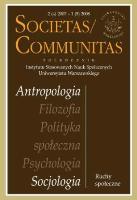Młodzież Wszechpolska i Kościół: ureligijnienie polityki i polityzacja religijności
Młodzież Wszechpolska (All-Polish Youth) and the Church: When Religion becomes Political and Politics - Religious
Author(s): Tomasz WrzosekSubject(s): Social Sciences
Published by: Instytut Stosowanych Nauk Społecznych Uniwersytetu Warszawskiego
Keywords: social movements; Mobilization; Religion; the Arts
Summary/Abstract: I describe the basic traits of religiousness of the Catholic-Nationalist organization All-Polish Youth. My analysis focuses on three types of religious expression: interpretation of the elements of Catholic religious doctrine, religious practices observed by members of the movement, and quoted religious authorities. I claim that APY members manage to combine Catholicism (by definition a universal religion) with particularistic nationalism, owing to their selective emphasis on isolated fragments of theology, supported by selected quotes of authories such as pope John Paul II or the late primate of Poland Stefan Wyszyński. This means that APY members treat religion as an instrument to promote their political and social views. I also demonstrate that APY religiousness is essentially traditionalististic, as its members do not accept the modern concept of separation of Church and State, while their interpretation of Catholic doctrine is closer to the spirit of the Council of Trent than to Vatican II. practices observed by members of the movement, and quoted religious authorities. I claim that APY members manage to combine Catholicism (by definition a universal religion) with particularistic nationalism, owing to their selective emphasis on isolated fragments of theology, supported by selected quotes of authories such as pope John Paul II or the late primate of Poland Stefan Wyszyński. This means that APY members treat religion as an instrument to promote their political and social views. I also demonstrate that APY religiousness is essentially traditionalististic, as its members do not accept the modern concept of separation of Church and State, while their interpretation of Catholic doctrine is closer to the spirit of the Council of Trent than to Vatican II.
Journal: Societas/Communitas
- Issue Year: 2007
- Issue No: 04+05
- Page Range: 215-229
- Page Count: 14
- Language: Polish

